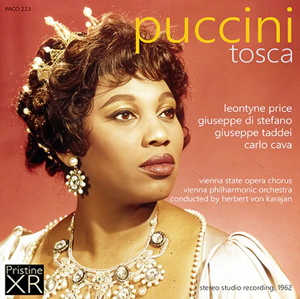
Giacomo Puccini (1858-1924)
Tosca – opera in three acts (1900)
Floria Tosca: Leontyne Price (soprano)
Cavaradossi: Giuseppe di Stefano (tenor)
Scarpia: Giuseppe Taddei (baritone)
Vienna State Opera Chorus, Vienna Philharmonic Orchestra/Herbert von Karajan
rec. in stereo 24-30 September 1962, Sofiensaal, Vienna, Austria
Sound effects recorded 6 & 9 December 1962
Pristine Audio PACO223 [113]
As ever, with a new Pristine remastering, the first consideration is what improvement Andrew Rose’s XR Remastering has been able to make to the sound – and certainly there is a new sharpness and depth to it; it is more forward, more detailed and has a wider perspective, but Rose himself acknowledges “what a brilliant job producer John Culshaw had done 63 years ago” before he tidied it up. The rattling of keys is vividly realised – but so, too, are the excessively numerous and hammy falsetto whoops and squeaks the never-knowingly-subtle Fernando Corena as the Sacristan keeps injecting into his vocal line for “comic” effect. The man needed taking in hand by Karajan and told to stop over-acting; his mugging is intolerable. Cavaradossi’s entrance reveals just how much Di Stefano’s previously honeyed tone has hardened; if, like me, you are imprinted with his performance nearly a decade earlier with Callas, you will register how much of its beauty has evaporated for all his commitment.
To her credit, Price is concerned right from the start to ensure that her sometimes slightly weak lower register measures up to the power of her middle and upper voice and the steadiness of her line and legato in combination with the shimmering beauty of her tone; it is a voice you can drink in. It is only a pity that Di Stefano sometimes sounds shouty alongside her – except when he frequently resorts to a soft head voice for tenderness. Having said that, “Qual’occhio al mondo” goes well, suffused with passion, as does the top B in “La vita mi costasse”; we get plenty of glimpses of the old Di Stefano. Likewise, he hangs on to “Vittoria!” doggedly even if he resorts to some shouting afterwards. I wish, too, that he did not offer a crude guffaw after “E rido ancor”.
Taddei is a constantly threatening and malevolent presence but I would not by any means say that either his verbal infections or vocal proficiency surpasses Gobbi’s. He is undoubtedly convincing oleaginous in his dealings with Tosca but I do not find that his phrasing imprints itself on my consciousness the way Gobbi’s does. Nor can I agree with the opinion in the notes that he has “a much richer instrument” than Gobbi. Unexpectedly, it is Price’s restrained yet concentrated characterisation of Tosca I find the most compelling; she avoids undue exaggeration or extraneous noises, relying upon purely vocal means to underline the emotion and drama of her utterances – and it works, because the voice is unfailingly ductile and responsive.
Karajan’s direction is urgent and flexible by turns, drawing out every nuance and all the tension and excitement in the score – and its lush grandeur, too. I do think, however, that “Va, Tosca!” is taken too slowly and Taddei’s vibrato labours a bit throughout Karajan’s very slow tempo, despite the impact of the climax, giving full rein to the VPO brass. Time and again, those used to the de Sabata recording will note how much richer the VPO are in certain exposed orchestral passages such as that just after “E lucevan le stelle” before the lovers are reunited.
The torture scene is mightily effective, its brutality underlined by the weight of the VPO’s playing, Taddei’s snarl and the solidity of Price’s voice throughout its range. “Vissi d’arte” is of course a highlight, lovingly prolonged but not milked. Her “Or gli perdono” is dark and chilling.
The opening to the third act with the shepherd boy’s song and morning bells is highly atmospheric, greatly enhanced by the remastering. Di Stefano’s diminished vocal resources are particularly evident in his soft singing of the introduction to “E lucevan le stelle” and there is a lack of effulgence in his tone for its climax; likewise, much of “O dolci mani” is essentially crooned, but he brings great feeling to it. Price’s top C isn’t huge but it’s very steady; so much going on here is musically highly satisfying even though the tenor is evidently husbanding his resources.
Admirers of Price in her youthful prime will want to hear this especially now it is sonically so spectacular, just as Karajan devotees will want to hear his special gift for creating enormous orchestral sonority. More controversial points of Interest are how cleverly Di Stefano disguises and even exploits a certain diminution of his vocal resources and whether, as some claim, Taddei is really a Scarpia superior to Gobbi’s famous interpretation. For me, it is not as gripping, good though it is.
Ralph Moore
Availability: Pristine ClassicalOther cast
Angelotti: Carlo Cava (bass)
Spoletta: Piero de Palma (tenor)
Shepherd Boy: Herbert Weiss (treble)
Sciarrone: Leonardo Monreale (bass)
Gaoler: Alfredo Marriotti (bass)


















